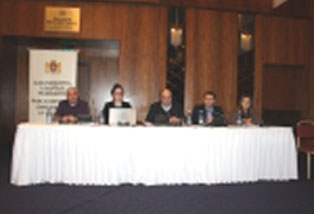Presentation of the Report on the State of Human Rights in Institutions for Persons with Disabilities for 2012

On February 28, 2013 Ucha Nanuashvili, the Public Defender of Georgia presented the Report on the State of Human Rights in Institutions for Persons with Disabilities for 2012.
The monitoring was carried out within the framework of the National Preventive Mechanism, in partnership with the international organization “Disability Rights International” and with the financial support of the “Open Society Georgia Foundation”.
Representatives of the government, international and nongovernmental organizations attended the presentation.
Public Defender opened the event. According to his statement, different types of problems exist in the protection of human rights of persons with disabilities. In particular: ensuring equal opportunities, stereotypes, education and social protection, healthcare mechanisms corresponding to the needs of persons with disabilities, freedom and accessibility to information, infrastructural obstacles, low level of engagement of state institutions or local self-governmental bodies. Solving these problems is essential for full integration of persons with disabilities in the society. This in itself implies rejection of discriminatory policy and removal of all types of barriers.
Public Defender of Georgia called state institutions to protect rights of persons with disabilities within the framework of implementing existing human rights conventions. At the same time he supported the ratification of 2006 UN Convention on Rights of Persons with Disabilities.
Anna Arganashvili presented the Report on the State of Human Rights in Institutions for Persons with Disabilities for 2012.
In the process of monitoring different types of violations were revealed in 11 establishments. Ill-treatment was documented in the institutions for both children and adults with disabilities. Facts of physical restraint of persons with disabilities contradicting with the norms established by the legislation of Georgia were found.
Particularly serious violations were documented in terms of restriction of medical service for children with disabilities. Among these violations particular attention should be paid to refusal to carry out medical intervention and to provide palliative care for children diagnosed with hydrocephaly. The service of psycho-social rehabilitation was restricted in absolutely all the institutions.
In fact, none of the persons with disabilities is given the opportunity to develop his/her functional abilities and skills of independent living. Rights of persons with disabilities to legal assistance and private and family life are restricted. They are not able to maintain contact with their children and other members of their families. The global restriction of access to outside world prevents them from living a full live even in the environment of an institution for persons with disabilities.
The shortage of staff, lack of relevant professional methods of approach and qualification creates a danger of violence among beneficiaries as well as between the beneficiaries and personnel. Such practices may lead to severe damage of health or other lethal consequences.
In the process of monitoring, interviewed beneficiaries discussed different types of violence: According to their statements acts of beating, tying to the bed, beating with a ruler, standing in the corridor from one meal to another, pulling the hair, beating in the head, beating with a long, white plastic stick, slapping in the face, pulling the ear, forcing to tidy up toilets or to change the dirty underwear of other beneficiaries are frequent.
Excessive consumption of alcohol by members of the administration in the working hours and in the territory of the institution was named as a serious problem. Alcohol consumption in the institution was also confirmed by staff members and parents of beneficiaries.
Facts of psychological coercion, threats, and interventions violating the inviolability of an individual were also detected. Beneficiaries are threatened with ignorance, abandonment; they are limited in the provision of food and in satisfaction of daily needs and etc.
In the process of monitoring members of the Preventive Group found facts of limiting medical services. Facts of refusal to provide urgent medical service, late and inadequate medical service, late hospitalization, refusal to provide medical service were also detected.
*The full report can be retrieved from the website of the Public Defender:
http://www.ombudsman.ge/files/downloads/ge/rbzhlpymnnahyxlbpjyz.pdf
Koba Nadiradze the representative of the Youth Centre on Independent Living and co-reporter underlined hard living conditions in the Institutions.
After the presentation a workshop was held with nongovernmental organizations which presented their views and expressed their will of active cooperation with the Office of Public Defender of Georgia. Participants analyzed the problems in this sphere. Public Defender and nongovernmental organizations determined future cooperation plans.
It was mentioned that schools are no more provided with books in Braille alphabet and with special mechanisms essential for the education of children with disabilities. The will for more involvement of the Ministry of Education and Science and the Ministry of Labour, Health and Social Affairs in the protection of rights of persons with disabilities was expressed.
David Lomidze, the Deputy Minister of Labour, Health and Social Affairs stated that many problems exist in this sphere and government takes responsibility for their solution. He also discussed cooperation between the Public Defender and the Ministry and addressed Public Defender to transmit cases to the Ministry for swift response. According to the information provided by the Deputy Minister call for applications has been announced for the selection of qualified personnel at closed type institutions. Maximum efforts will be rendered in order to continue the deinstitutionalization process.
In the last part the Public Defender of Georgia stated that he will actively cooperate with governmental as well as nongovernmental bodies in order to protect, lobby and realize rights of persons with disabilities through result oriented activities. He discussed planned projects toward researching needs and problems of women and children with disabilities as well as toward studying human rights situation of persons with disabilities in penitentiary establishments.



